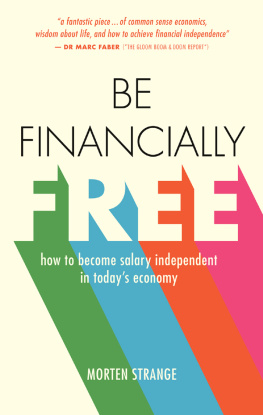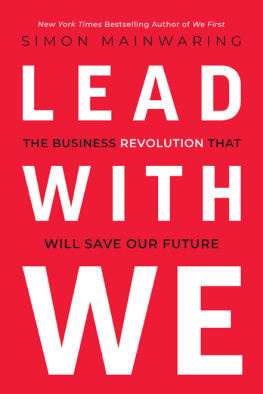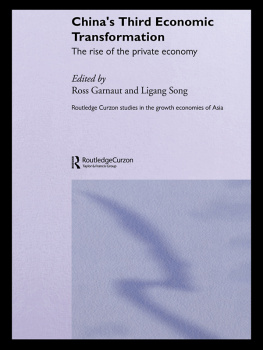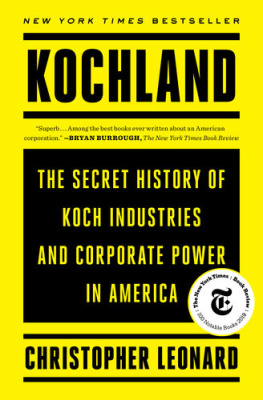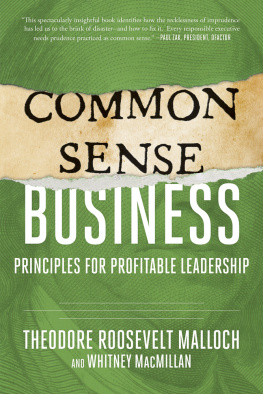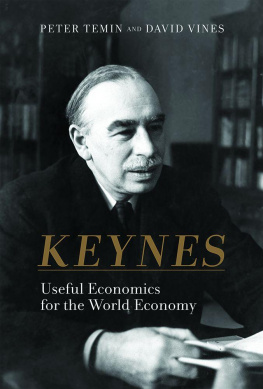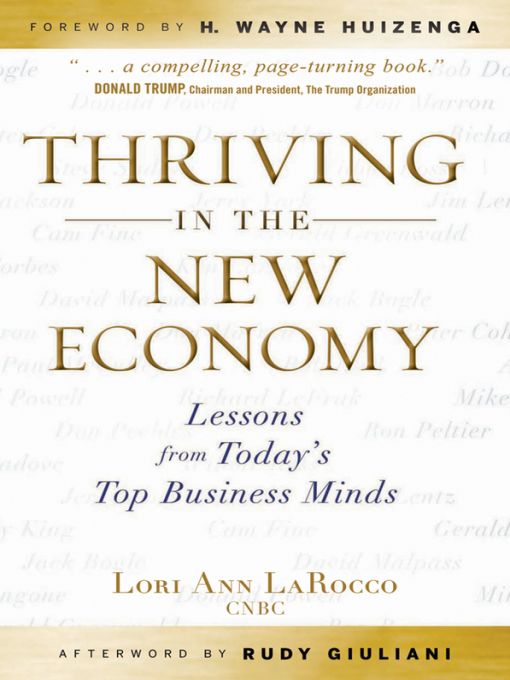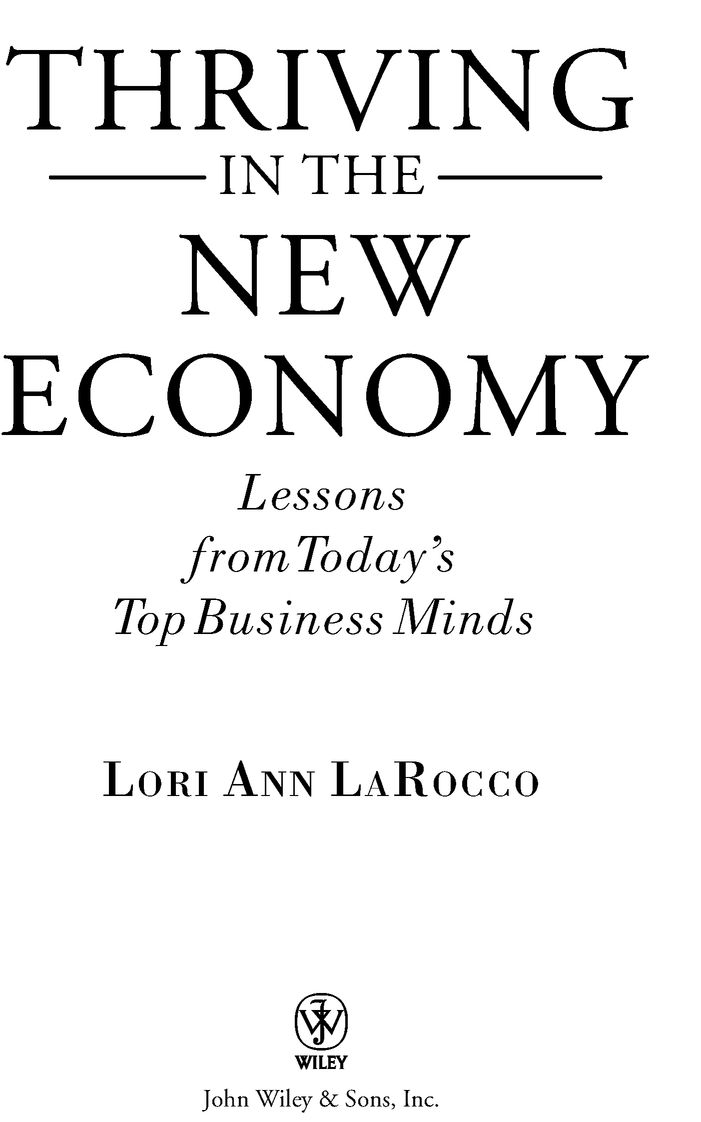Table of Contents
This book is dedicated to my true companion
my husband, Michael
and my three wonderful children:
Nicholas, Declan, and Abigail.
Thank you for understanding mommys even crazier schedule.
FOREWORD
H. Wayne Huizenga
Today we find ourselves in what may be the most troubled economy in three generations. For a good number of Americans, the biggest concern isnt how to survive in todays new economyits how to thrive in it. There were signs. All of us could see that we were due for a rough patch.
What no one could have predicted with any confidence was just how rough that patch would be. After all, you have government doing what it can to overstep its bounds. Every day, Washington is making decisions it simply has no business making, deciding which companies continue and which ones fold up.
Thats not capitalism, and its certainly not a free market. There are plenty of companies out there that are successful even in todays downturn, and they deserve the exact same opportunity to succeed that their predecessors did. In fact, when you consider that these companies are prospering in the face of such extraordinarily dire circumstances, you could credibly argue that they deserve even greater latitude to conduct their affairs in the manner of their choosing. After all, theyre the ultimate survivors, the companies most able to prove their value to the marketplace at a time when the marketplace is most resistant.
These are businesses whose leaders have a genuinely rare combination of vision, ingenuity, and energy. People whose fortunes rise and fall based on the decisions they make every dayand who excel at making great decisions time and again.
Compare them with the government bureaucrats making their own decisions about the businesses they run. These are people who frequently have little or no corporate experience, whove seldom had to worry about whether the choices they make today will benefit them directly or influence the prospects of the organization they work for. Yet these are the people making rules that impact the world of business arbitrarily and capriciously.
That isnt to say that I believe business is without blame in our current environment. Too many companies have indeed stepped over the line. And yes, we do need some realignment to address these excesses. But we must temper that with the understanding that the more regulated we become, the less free we become.
In fact, I believe with everything I am that maintaining free markets is the single most effective thing we can do to foster continued growth and opportunity in the United States. There is no such thing as a limit on the number of visionaries out there. A new Bill Gates could be in the making right now. Theres a good chance the next Warren Buffett is entering business school in the fall semester. And there are certainly others with the talent and drive to eclipse my own accomplishments. Their fields may be variedfor some of them, their fields may not even exist yetbut the one thing they all need collectively to succeed is a fair and functioning free market system.
I look at Mike Jackson of AutoNation, Mike Duke of Walmart, Evan Williams of Twitter, and Wilbur Ross of WL Ross & Co.; all of them are people who are leading, changing the market, and yes, making money in an environment like this. Although each has a different story to tell, they all share the leadership and foresight that allowed them to take advantage of a changing economy and reach out to consumers with a proposition that proved compelling, even in challenging times.
This book looks at how real leaders tackle crisis and succeedhow they take a risk, plan for the future, and create growth opportunities. Its about how real leaders managed to thrive in our new economy. Spend time with its subjects, and youll see that opportunity does indeed exist and that the best role for government to play is as a partner to enterprise, helping promote an environment that rewards innovation, diligence, and creativity.
Ultimately, I believe that organically successful companiesthat is, companies that generate their own success by interacting favorably with the marketwill prove themselves to be todays truest winners. When the economy inevitably recovers, they will be the ones to emerge with the strongest brands in their fields and the greatest prospects for ongoing growth. But for this to happen, and for our economy as a whole to become healthy again, we must follow the free market model. Flawed as it may be, it still undeniably provides the worlds greatest opportunity for business to thrive.
H. Wayne Huizenga is one of Americas greatest entrepreneurs. He founded Blockbuster and AutoNation and is owner of the Miami Dolphins.
PREFACE
Historys defining moments have taught us that leaders are tested, made, or broken, and we are living in one of those moments right now. When the markets collapsed in September 2008and as one spectacular failure rode on the heels of anotherpeople wondered when it would end. As we entered each weekend of that month, my CNBC show Squawk Box left the guest list loose. There was no sense in trying to fill up the show with guests for Monday when we had two entire days left between shows, and anything could happen. The weekends quickly turned into a wait and see of which company would fail and which one Uncle Sam would rescue. We would book our Monday morning news makers on Sunday.
This market crisis took me back to my years as the night side assignment editor at WFTV-TV in Orlando. The wildfires of the 1990s were consuming hundreds of acres in central Florida; the winds were picking up, and there was no rain in sight to quench the parched soil. Despite the fact that the flames were miles away, I can remember the dense, stifling smell of the forest fires hanging in the newsroom. Watching the images of flames several stories high swallowing up trees and homes in a blink, I thought to myself, When will this end? No one knew; we were in unchartered territory. A crisis like this had no timeline. The unknown was the most frightening thing we were facing.
The September 2008 economic crisis was in fact a firestorm engulfing the markets. Much like the massive Florida wildfires of the 1990s, we were reporting on events we had never seen before. We were reporting on history. No one knew when the market turmoil would end or what kind of reaction the rest of the world would have to the U.S. markets. It was a global crisis. Both Main Street and Wall Street depended on our program for unbiased, actionable, and up-to-the-minute information. Its a responsibility we never took lightly.
The mantra too big to fail became the it phrase as investors tried to wrap their arms around what was happening. The 401(k) plan quickly became 201k, and the once-golden boys of Wall Street joined thousands of others who were out of jobs. But despite the credit crunch and economic headwinds, there are captains of industry out there who are not only surviving but thriving in this the New Economy, and what makes these leaders unique are the strategies they employ. They are the ultimate chess players in the economy game. By offering advice, cutting budgets by millions of dollars, and meticulously managing their investments, these pace-setters are navigating through the turbulent marketsand not being swallowed up in the undertow. As Senior Talent Producer for CNBC, I am lucky to speak with some of the worlds richest and most successful businesspeople on a daily basis.


